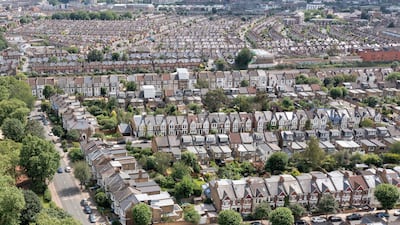The price of a typical UK home has topped £250,000 for the first time, according to Nationwide Building Society, an increase of £30,728 since the pandemic started in March 2020.
House prices rose 9.9 per cent in October, compared to the same month last year, taking the average house price to £250,311, an uplift of 0.7 per cent on September, the Nationwide House Price Index found.
Robert Gardner, Nationwide's chief economist, said demand for homes has stayed strong despite the expiry of the stamp duty holiday at the end of September, however, “the outlook remains extremely uncertain” with the Bank of England expected to increase interest rates this week.
“If the labour market remains resilient, conditions may stay fairly buoyant in the coming months – especially as the market continues to have momentum and there is scope for ongoing shifts in housing preferences as a result of the pandemic to continue to support activity,” Mr Gardener said.
Britain’s property market experienced a mini boom during the pandemic after Chancellor of the Exchequer Rishi Sunak unveiled a tax break giving buyers a saving of up to £15,000 on the first £500,000 of a purchase.
Other factors driving the surge included record low interest rates and a desire for more space as buyers adapted to a life of lockdowns and working form home.
However, there are some signs the market is cooling. While mortgage applications remained robust at 72,645 in September, more than 10 per cent above the monthly average recorded in 2019, the figure was down on the 74,453 figure seen in August and the 75,100 mortgages sanctioned in July.
Mr Gardener said a number of factors suggest the pace of activity may slow, including how the wider economy responds to the withdrawal of government support measures.
“Consumer confidence has weakened in recent months, partly as a result of a sharp increase in the cost of living,” he said.
“Even if wider economic conditions continue to improve, rising interest rates may exert a cooling influence on the market, though the impact on existing borrowers is likely to be modest, as discussed below.”
With rising speculation that the BoE will increase interest rates to 0.25 per cent or 0.5 per cent by the end of the year, this could add a further squeeze on living standards when households are already contending with higher inflation and soaring energy prices.
A 0.4 percentage point increase in rates to 0.5 per cent "is likely to have a modest impact on most borrowers who are on variable rates" said Mr Gardener.
"For example, on the average mortgage, an interest rate increase of 0.4 per cent would raise monthly payments by £28 to £625 (or around £335 extra per year), though a rise of bank rate to 1 per cent would see typical payments go up by a more substantial £64 to £660 (more than £760 per year approximately)."
Existing homeowners will be partly insulated because the share of outstanding mortgages on variable interest rates has fallen to a record low of around 20 per cent, down from a peak of 70 per cent in 2001, Nationwide said.
However, a small proportion of households already have a relatively high debt service burden, with about 10 per cent of homeowners spending more than 30 per cent of their gross income on their mortgage each month, according to 2019 data from the English Housing Survey.
"For those households, some of whom will be on variable rates, any rate rise will be a struggle, especially given the broader increase in the cost of living, even though the impact on the wider economy and most households is likely to be modest," Mr Gardener said.


